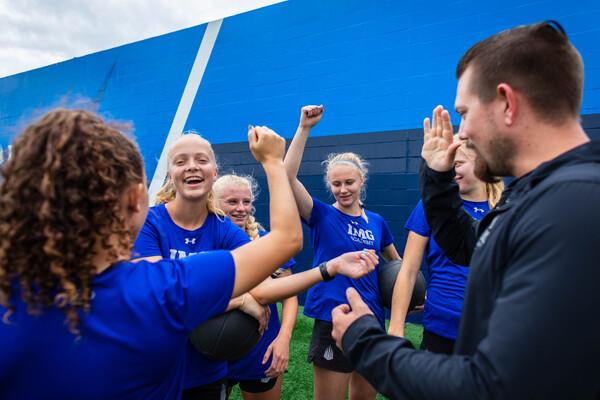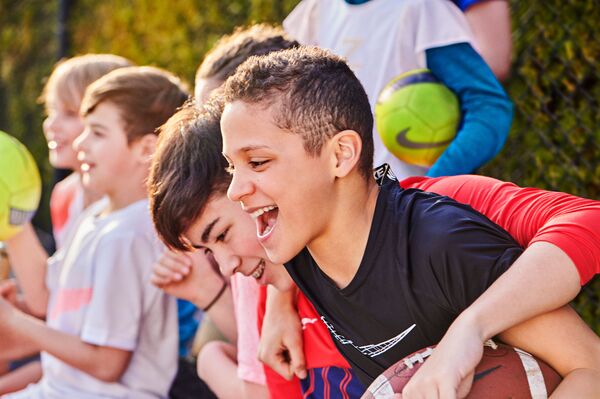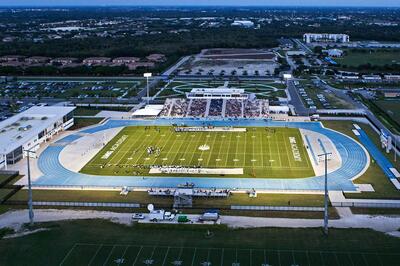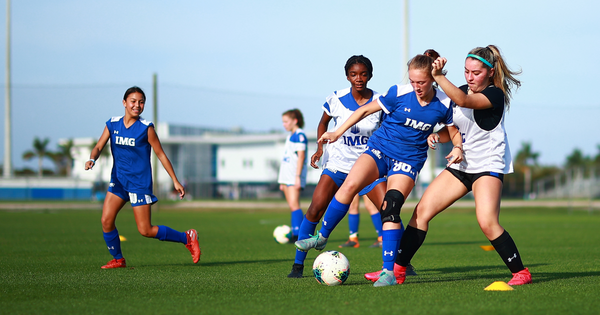
Sponsored Post by IMG Academy.
Sports camps provide youth athletes a chance to take time away from their home court and focus on developing their individual fundamentals and pertinent off-court skills. Finding time to focus on honing your game and building confidence sans competition remains an important element in continued improvement, and thankfully sports camps allow for just that.
Have you been considering a sports camp in between leagues, seasons, or tournaments? Going to camp could very well be the time when a few intricate details come together to trigger immense growth, or it may be the time when nerves settle and motivation kicks in again. Think lifelong friends outside of sport; think gaining insight from coaches who may see the game differently than your private coach; think a time to accelerate ahead of the competition. And, keep thinking! Here's a parents' guide to selecting the best camp for your family:
1. BEING A NAME VS. BEING A NUMBER
This concern is completely warranted, both on and off the field or court. Oversight remains a major factor, and on-court ratios matter just as much as the security and supervision off the field. Sports camps may be available as day camps only, or sleepaway camps may be an option. Deciding on a sports camp with amenities from residence halls, sports fields, and dining all in one location alleviates much of the preliminary safety concerns.
Oftentimes, sports camps also offer a secure location, because coaches and mentors understand that safety, without a doubt, comes first. With oversight comes age-appropriate activities. 10 year olds and 17-18 year olds shouldn't be engaged in the same evening events or necessarily working out and learning the same mental aptitude training elements either. Understanding the on-court and post-training schedule will assist with making the right decision for your sports camp destination. When determining if a camp offers enough oversight, don't hesitate to understand whether campers are placed in one-two large groups, or if position-specific training takes place in additional small group and personalized sessions.Â
"The IMG Academy campus gives us as parents, a great sense of reassurance, knowing that our children are in a safe, well-disciplined and stimulating environment which enhances their self-worth."Â
- Arturo C., Parent of three IMG Academy student-athletes
2. WHAT'S COVERED AT CAMP
Sport training may be the answer coming to mind, but there's so much more to this question! Does the camp you're considering hold classroom analysis or video review sessions? Are there college recruiting education seminars and guidance? Do you repeat the same content from week to week, or is there a progressive curriculum model?
We know that sports are all about mental acuity, so ensuring that training other than simply sport is available may be the determining factor. Additionally, sometimes, it's more about the complete experience and less about sports - and that's perfectly okay! Mixing in extracurriculars is so important, especially if the break between camp and season remains quite limited. Some sports camps also offer off-campus evening trips or weekend activities, such as supervised travel to amusement parks, local attractions, beaches, and more!
"Our mission is to provide players the skills necessary to excel, the physical capabilities to perform, the mental approach to produce, and the lifestyle habits necessary to unleash their potential. The goal is simple - to help players of all ability levels reach their potential."
- Shell Dailey, head coach and director of IMG Academy girls basketballÂ
3. WHO ARE MYÂ COACHES
Sports camps in the summer (May-August) tend to attract larger numbers than during the school year, but that doesn't mean coaching experience should differ. Understanding where coaches have competed or previously coached should be a must-know during your camp search. If the camp is held at a school (high school or college,) will your children be learning from those coaches, who have undergone rigorous training and examination, or are the coaches part-time or college staff?
Learning from coaches with various elements of experience, from local to international to college to the pro level, could make all the difference and provide alternative viewpoints rarely earned during the regular season. And, how about post-camp? Do the coaches analyze or review the campers or move onto the next week of campers? Receiving a piece of detailed evaluation on strengths and weaknesses just might be that take-home piece to ensure campers are retaining what they learned at their sleepaway camp.
"[IMG Academy]Â helped me mature as an athlete. The whole academy just sets you up for success. You have some of the best coaches in the country that are always willing to help you. They have been at the highest level, so you learn from the best."
-Â Blair Gavin, 2004 IMG Academy alumni, former MLS player, and current Phoenix Rising FC assistant coach
4. YOUR SCHEDULE VS. CAMP SCHEDULES
Scheduling camp can be tricky, especially when dealing with sports. Some camps may only offer select weeks of training while others may host year-round camps. Additional items to consider are camp durations, if you're able to start and leave at your convenience, and if programming varies depending on the time of year. Summer camps are crucial to development, but how about off-season training before the holidays - a time oftentimes overlooked when scheduling a sports camp. Having the flexibility of attending a sports camp and not having to alter your family's plans because of limited training makes the process that much better!
And, once you understand whether a camp program may be possible with your schedule, it's always a benefit to understand if programs are available in weekly or progressive platforms. Just like you wouldn't enjoy going through training for your job from week to week, so should a camper be able to build off of week 1 into following weeks should your camp of choice offer this option.
"It's amazing how much I have improved over just the last two weeks. My stick skills have gotten so much better. It's unbelievable."
-Â Hagan B., IMG Academy lacrosse summer camper
Â
5. SPORTS DEVELOPMENT
As noted in #2, the camp curriculum remains a crucial factor when determining which sports camp to attend. But, not only should you review the progressive nature of camp and whether position-specific training is offered, but you may also be interested in knowing if off-field training appears in the curriculum. From mental conditioning, nutrition, and speed and movement to vision training and leadership - these items provide campers the opportunity to gain that differentiating factor that the competition may have otherwise overlooked.
Of course, eight hours on the court may lead to some serious results, but having sessions geared towards the intricacies of the game may truly make all the difference. Hand-eye coordination, mental toughness, vision and reaction, hydration, and even regeneration - all pertinent items that may be of-interest when researching that perfect sports camp fit for your family!
"In this day and age of travel and showcase baseball, there seems to be less of an emphasis on fundamental and skill development. Through extensive practice routines and drills, IMG Academy baseball camps take a comprehensive approach to develop the complete player."
- Dan Simonds, Director of IMG Academy baseball
Â
Learn more about IMG Academy's sports camps by clicking this link.
Â

















